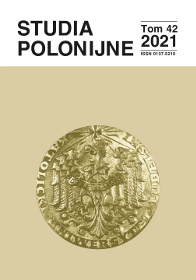Migration Strategies and Experiences of Students – Based on own Research in 2020
Main Article Content
Abstract
In the respect of migration, the movement of people in order to achieve their intended goals (material, emotional, academic, etc.), it remains interesting from a research perspective to study the strategies of migrants as participants in migration to approach their lives as well as shaping life based on travelling abroad. The authors as well base their article on the research experience of other authors who analysed similar or equal aspects of migration of Poles after the enlargement of the European Union structures on 1st May 2004. However, due to the limitations of travelling and the impossibility of carrying out field research, we, as authors, determined to interview the academic youth with reference to their opinions on the mentioned issue. After all, young people assume certain strategies for realizing their own plans for life, which might be related to migration experiences or intentions in this area. In this article, the authors will attempt to explain the matter: what are the preferences and opinions of the respondents (students of Kraków’s universities) concerning travelling abroad? We will as well make an effort to define the term of migration strategy from the analytical point of view and we will also try to show the respondents’ strategies in connection with their possible migration experiences or migration intentions.
Article Details
References
Drinkwater S., Eade J., Garapich M.P., Polscy migranci w Londynie – klasa społeczna i etniczność. Center for Research on Nationalism, Ethnicity and Multiculturalism, University of Surrey. CRONEM 2006, https://www.surrey.ac.uk/cronem/files/RAPORT-finalny.pdf [accessed: 01.01.2016].
Ellis F., Rural livelihoods and diversity in developing countries, Oxford: Oxford University Press 2000.
Fudge J., Global Care Chains: Transnational Migrant Care Workers, http://www.ialsnet.org/meetings/labour/papers/FudgeCanada.pdf [accessed: 12.12.2011].
Gacek M., Strategie migracyjne Polaków po 2004 roku. Przypadek Szkocji, “Pogranicze. Polish Borderlands Studies” 1(2013), no. 1, pp. 106-116.
Klimek Ł., Polscy migranci mieszkający w Irlandii ich strategie akulturacyjne i stosunek wobec integracji, “Studia Migracyjne – Przegląd Polonijny” 38(2012), no. 3, pp. 27-49.
Kniejska P., Between virtual intimacy and the transfer of family members to the workplace. Strategies of migrant care workers to deal with the temporary separation from their families in Poland, “Studia Migracyjne – Przegląd Polonijny” 41(2015), no. 3(157), pp. 123–138.
Kozak S., Patologia eurosieroctwa w Polsce. Skutki migracji zarobkowej dla dzieci i ich rodzin, Warszawa: Wydawnictwo Difin 2010.
Kozielska J., Poakcesyjne migracje zarobkowe. Kontekst teoretyczno-empiryczny. Wsparcie społeczne, Poznań: Wydawnictwo Naukowe Uniwersytetu Adama Mickiewicza 2014.
Lee E., A Theory of migration, “Demography” 1966, vol. 3, pp. 47-57.
Okólski M., Grabowska-Lusińska I., Najnowsza emigracja z Polski – raport OBM, “Biuletyn Migracyjny” 2008, no. 16, pp. 1, 7-8.
Pustułka P., Polish Mothers on the Move: Transnationality and Discourses of Gender, Care, and Co-residentiality Requirement in the Narratives of Polish Women Raising Children in the West, “Studia Sociologica” 4(2012), vol. 2, pp. 162-175.
Richmond A., Immigration and Structural Change: The Canadian Experience 1992, 1971-1986, “International Migration Review” 1992, vol. 26, no. 4, pp. 1200-1221.
Stalker P., The No-nonsense Guide to Internetional Migration, London: Versa 2001.
White A., Polish circular migration and marginality: a livelihood strategy approach, “Studia Migracyjne – Przegląd Polonijny” 42(2016), no. 1(159), pp. 151-164.

